I Like __ A Lot
The Feeling of Floating, Like the Body is Absent: My Favorite Books of 2011
Reality meant that I could neither afford nor have time to read every book that came out this year that I wanted to read, but out of what I did read (which was, coincidentally, a lot more books than I normally read that are released/realized in the year I currently exist in), the following were my favorites.
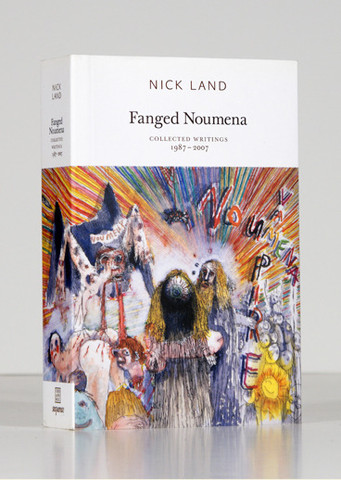
FANGED NOUMENA by NICK LAND
The first book on this list I haven’t even finished reading, an immense 560 page tome collecting virtually all of Nick Land’s writings from 1987-2007–excepting only the full-length text The Thirst for Annihilation: Georges Bataille and Virulent Nihilism–is a massively important text, because Nick Land is, in my opinion, one of the most important thinkers of our present. Land takes apart the world and rebuilds it, offering particularly apt readings of Kant, Nietzsche, Bataille, Heidegger, and more that really flows new light into the dusty thoughts of many often-over-valued thinkers (can a known philosopher be over-valued? maybe not, but often the most known/taught readings of said thinkers certainly can be). Land pioneered the idea of the theory-fiction, using fiction as a tool to explore critical theory, a technique now practice by many affiliated with the book’s press, Urbanomic. This book is a map towards the next level, and as the jacket copy proposes: “Can what is playing you make it to Level 2?”
Buy from Urbanomic (in the UK) or Sequence Press (in the US)
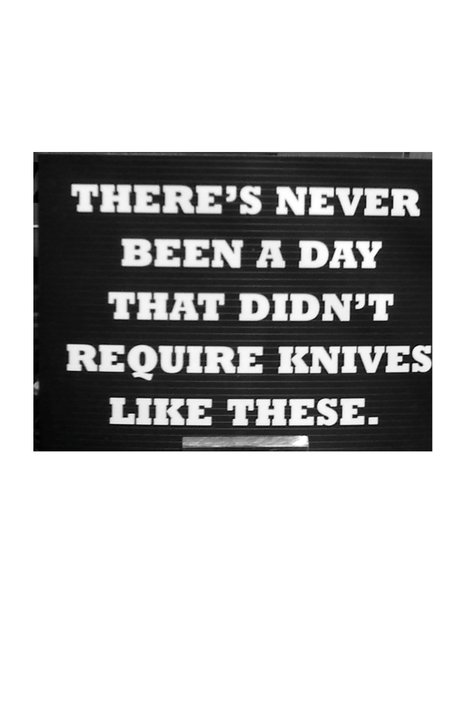
THERE’S NEVER BEEN A DAY THAT DIDN’T REQUIRE KNIVES LIKE THESE by JEFF GRIFFIN
Jeff Griffin is a poet who is, sometimes, from Iowa, who writes some of the most amazing contemporary poetry I’ve encountered. THERE’S NEVER BEEN A DAY… is, as the Human500 website describes, “A book composed of transcriptions of found papers from the desert and original poems by Jeff Griffin.” It’s a hazy mess of desperation and excitement, the desert being a place of secrets, magic, and despair. I read this hung-over in a train-station after I missed my train and had two hours to kill, and upon finishing it I relished my hang-over, smiled to myself, shut my eyes, and blissed out until it was finally time for me to board my train.
Out of print from Human 500
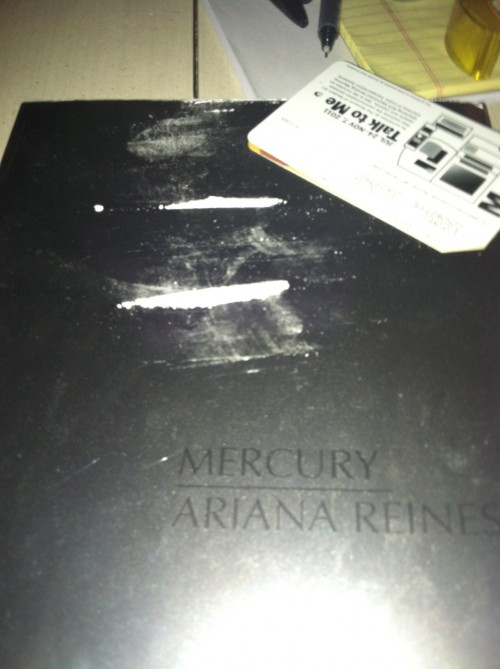
MERCURY by ARIANA REINES
I read a section of this, Save the World, when it was released by Ariana’s press, MAL-O-MAR, early in 2011, and that excerpt made me very excited. Ariana herself has said that the book as a whole did not fully come together until a very short period before it was sent to the publisher, and the shape the final book takes is an incredibly mystical work that unfolds perfectly, fusing all of poetry into a source of energy. There has been a moderate amount of press regarding this book both here and at other lit-hubs of the net lately, and this praise is beyond well deserved, because this book is magick in itself.
Buy it from Fence Books
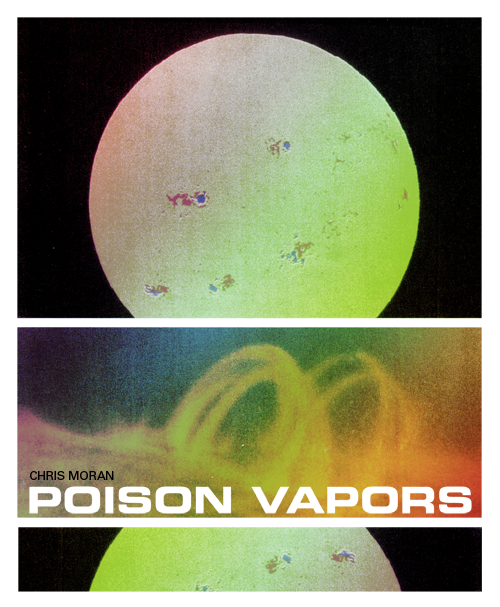
POISON VAPORS by CHRIS MORAN
It is arguably tacky to put a book one personally released on a list of favorite books of the year, but the reason I released Moran’s poetry on my micro-press is because it’s fucking amazing. Existing first only as a few fragments posted on Chris’s blog, I fell in love and asked if he had more to add up to a complete manuscript. A few weeks later he emailed me a final, short chapbook, and it was perfect. The poems in Poison Vapors are ritual acts calling to the future, a mystic sightedness pointing to the new as filtered through the adages of the old. Texts that call towards an idea of god. Borrowing from science-fiction motifs, Moran’s poetry is remarkably present.
But it (or read the PDF) at SOLAR▲LUXURIANCE
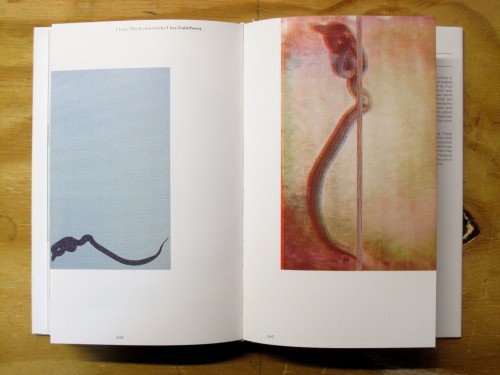
SPINE by R.H. QUAYTMAN
I fell in love with the work of R.H. Quaytman the first time I visited San Francisco before I moved here, when a show of her work was up in the SFMOMA. Quaytman’s paintings are aesthetically perfect, and they carry a mood and conceptual bent that adds up to total greatness. I haven’t read all of the text in the book yet, but to have all of Quaytman’s “chapters” in a single space brings the reader/viewer closer to a totality of vision, which is what every art-lover asks for when they can’t own the paintings themselves.
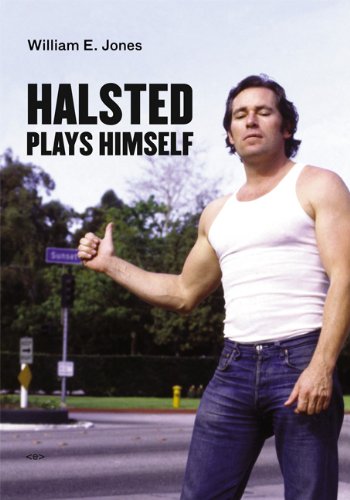
HALSTED PLAYS HIMSELF by WILLIAM E. JONES
As someone who has, personally, experienced the ecstatic throes of obsession over a pornstar (link NSFW) to the point of ostensibly writing an entire novella about him, obsession and pornography are two things that, when linked together, generally speak in a language I can understand. And, as I’m also someone who was briefly obsessed with Fred Halsted, a brilliant paradox of a porn-star, filmmaker, and artist, I was beyond excited when I found out this book was seeing the light of day. Jones’s book traces the story of Halsted through his work on one of the pivotal films of all-male pornography (a film that has also been validated by the Museum of Modern Art as art), LA PLAYS ITSELF and the rest of what he accomplished through his ultimately sad life. Interviews, vintage film reviews, and secondary sources pad out the primary details offered up by Jones, as well as an ample amount of photographs and some of Halsted’s erotic writing itself. An absolutely boner-inducing read, Halsted serves as some sort of pessimistic role-model within the realm of desperation and experimentation.
Buy from Semiotext(e)
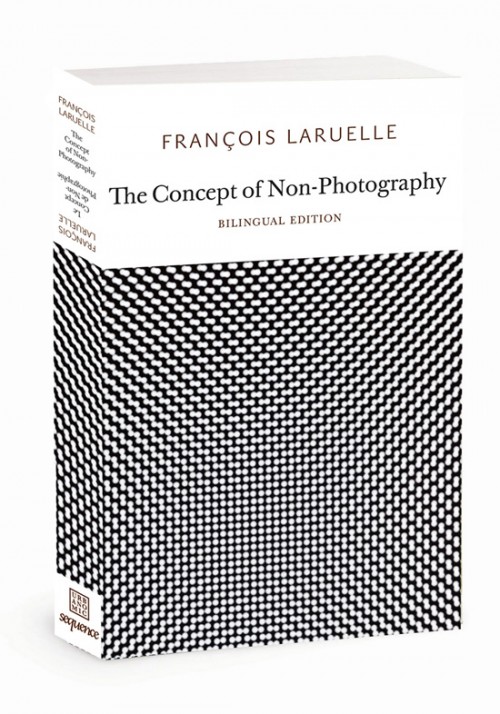
THE CONCEPT OF NON-PHOTOGRAPHY by FRANCOIS LARUELLE
I will be the first to admit that much of this text went directly over my head, particularly in the final third, but the parts that I did understand, at least on a basic level, I understood within a mode that fired synapses and helped me to recontextualize the way that I view the idea of the image, the photograph, reality. Laruelle has been re-configuring philosophy into what he calls “non-philosophy,” and this book opens the door to these ideas in a method that, for me at least, was a route that I could more immediately understand. Not inherently a book about ‘photography’ per se, rather a book about seeing and how the photograph is its own fiction, the world and its double, file this under “steps to Level 2.”
Buy from Urbanomic (in the UK) or Sequence Press (in the US)
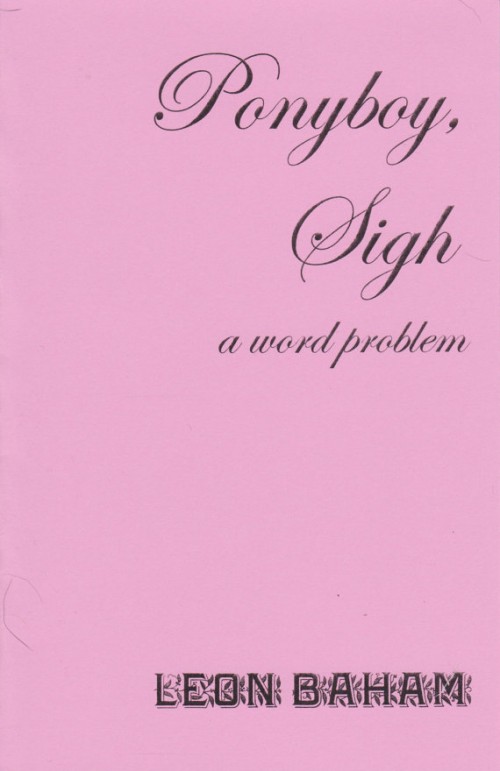
PONYBOY, SIGH by LEON BANHAM
Ponyboy, Sigh is the first remarkably queer text that I’ve encountered that has had me so excited I jumped up and down since I spent a lot of time reading Kathy Acker (who must be, surely, Ponyboy‘s mother-in-law). Assuming a hybridity in form that echoes the revolutionary queer identity guiding the text, the protagonist guides through a narrative in poetic forms and verse, dovetailing the essay, riding dialog, and fucking any preconceived notions of a narrative diegesis into abstraction, but in a beautiful, perfect way.
Buy it from Birds of Lace Press
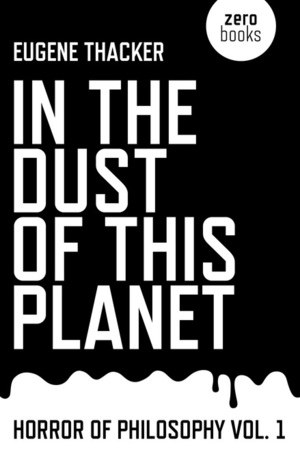
IN THE DUST OF THIS PLANET by EUGENE THACKER
Thacker’s text was sort of the “frame” I’ve used to construct my “Zero-degree Noiselessness of Death” posts, carrying the tone and borrowing the structural form that Thacker adapts, the lectios. The text merges super-natural horror with a geotraumatic reality, the scientific absolute of the world and the culture we’ve thrown into it. I copied down five (typed-out) pages of excerpts that I refer to with regularity; the fact that there are two more volumes of this planned have me creaming my pants.
Get it from Zero Books
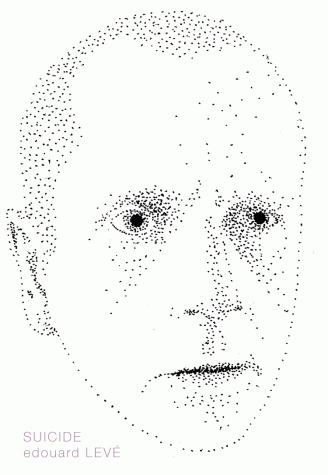
SUICIDE by EDOUARD LEVE
The only proper “novel” to make this list is hardly a novel at all. A decidedly non-fantastique faux-memoir in the second person, the intertextual play of Leve the artist/author with the protagonist of the book itself creates a zone of affect that the words in the book, the text itself, fills perfectly. I’ve also talked about this book before, but hardly has another book haunted me in the way this one has, a decidedly straight-forward complexity, a fictionalized reality used to approach reality as fiction.
Buy it from Dalkey Archive
OTHER BOOKS THAT CAME OUT THIS YEAR THAT I’VE EITHER ALREADY TALKED ABOUT EXTENSIVELY SOMEWHERE OR ARE JUST HONORABLE MENTIONS THAT YOU SHOULD KNOW ABOUT IF YOU DON’T
THERE IS NO YEAR, BLAKE BUTLER
THE MARBLED SWARM, DENNIS COOPER
WHY I LOVE BARTHES, ALAIN ROBBE-GRILLET
DIE WITH THESE BITCHES, JON LEON
SUICIDE NOTES, JERIMEE BLOEMEKE
Tags: 2011, antidote, favorite books

[…] Leon Baham’s Ponyboy, Sigh was named a best read of 2011 by both Johannes Gorannson and Mike Kitchell. […]
http://www.youtube.com/watch?v=jLKnCeeAW48
what happened to that awesome hot chocolate butt animation
Is this sketch comedy?
New stuff to read!
fuck i wanna read that jeff griffin book
Hey Mike, is Reines’s MERCURY a poetry collection or more like a narrative / story told in poetry?
yr taste is so tasty.
You wrote a novella about Ledermeister? I would like to know much more about this. May I have a link to more information?
http://nocolony.com/vol3info.html
Glad to see SUICIDE make a list. One of my favorites.
collection, really, though there’s narrative in its movement, it’s definitely not plot or traditionally narrative; aesthetically it is whole, and there are narratives throughout, but there is not a single direct narrative that runs through the whole thing (but there is a direct line of movement)
rad list, Mike
Edouard, Eduoard!
You oughta take a moist rag to that cover or Mercury. Someone might mistake it for a prop.
I read Mercury by Ariana Reines.
The images I remember the most are the brushed metal elevator in “Save the World,” an ice cream mound metaphor in a poem about rough (more like, distasteful) sex, and the “warm black / compact” in the Sephora poem. Adipose sky, that stayed w/ me in a tiny poem. The title “The Perforator God” stayed w/ me for one poem. I like “Truth and Consequences” a lot. Some reviews of this book are misleading, the writing is not “raw” or emotionally penetrating. She often says she lies to herself but never shares what those lies are for, for example. In many places the writing is overly intellectual but it often has a lovely rhythm and use of line breaks and is exciting in many other ways. This book is silver and tells you what it is: cold.
The all-caps poem and the poem with diagrams seemed gimmicky. On the other hand they made the book seem whole. I didn’t get the Magick thing. Was more interested in the theme of Nature, and the concept of “the world”” which Reines starts to explore. That seems very new to me and relevant and I am happy she is doing a sci-fi novel now. “Science Fiction” also stayed w/ me, it is a cold poem that hit a spot I can’t explain. It made closeness cold.
That’s my review.
I think when people are talking about Ariana’s writing being “raw” they’re probably talking about Couer de Lion, or something, as I don’t think Mercury is really “emotionally raw” or whatever either.
I have a sort of really deep hatred of “gimmicky” as a negative adjective, mostly because it presupposes writing without diagrams or writing not in all caps or something isn’t in itself a gimmick, because really traditional modes of writing are just so hegemonically hyper-present in the world of letters that any deviations, taking what words and printing things on pages can do beyond is othered, which honestly really bothers me, like just because most people don’t write with all caps doesn’t mean that writing with all caps IS a gimmick. I think I’ve written about this before, like extensively, but I’m not sure if it was here or somewhere else.
The magick in the book is what makes it so powerful.
if you remember where you might have written about the gimmick thing, could you possibly link it? I realize I could probably do this work on my own (especially if it was in fact somewhere on HTMLG) but I’m kind of lazy. anyway, you don’t have to like put effort into it or anything, but if it comes to mind that would be great. very interested in reading what you have to say about that stuff.
I agree, they’re prob talking about Couer de Lion which I haven’t read. I prob don’t mean “gimmicky” with the vehemence that others give it. Part of what makes the work exciting is its willingness to experiment. The poem that wall a solid wall of questions in caps, went through me is all. Buuuut . . . maybe if it were etched as public inscriptions on huge monoliths like the Vietnam War Memorial it wouldn’t have? Silver monoliths.
If you srsly think the magick in the book is what makes it “so powerful” then doesn’t that take away anything you could say about the writing. How is that any different from someone saying “the Christianity in the Chronicles of Narnia is what makes it so powerful”? PS I don’t like the Chronicles the Narnia.
I just realized the poem is not in questions, but “I can’t wait” statements. Don’t know why I remembered it that way … and there r some really amazing lines in there, it’s just that as a whole it didn’t move me
i love it when poems go through me
i love it when poems stop me cold
i love it when i can’t live and a poem thins out my blood
i love the heat
i love the cold
i like to have my temperature taken
a cold thermometer up the butthole
no that’s what i hate
the medical metal
i will be the cold metal bedpan you barf in
since i am the cold metal bedpan i barf in
i want to find out if i am running a temperature
you could cure me like
i hate a cold thermometer whose mercury won’t go hi enough i get to stay home from school
to turn what kills me into a cold metal needle
you could do acupuncture on me
you could heal me
can we love each other without turning each other into diapers to soak up the world
i’d rather you poke me in exactly the right place
if you can do it
you can have all the power
cure me or kill me
witch
doctor
“to turn what kills me into a cold metal needle”
yeah
i’m just a reader i can’t kill you or cure you! lol
To me it seemed like a secret premise of the book was to turn blood into mercury .. . not mercury into gold. The poem on the back of the book corroborates this “to divine wisdom in a purl of blood” … purls go with mercury more than blood. And if you think about it, wouldn’t you rather have mercury coursing through your veins than have solid gold in there? I’ll try to write a better review later. Thanks for your extra poem here lol. (I liked it).
<3 write a poem
the bit of ariana reines i’ve read tells me she has the warmest coldness
i want to read more
BARAKA is one of my absolute favorite poems in the entire book, so I think we’re just at odds here ;)
Here’s an artist talking, as Impossible does, about the foolishness of separating what’s ‘natural’ or ‘normal’ from what’s a “gimmick” wherever action is a matter of technique, of mediation: http://www.youtube.com/watch?v=7tAIhiinaw8 .